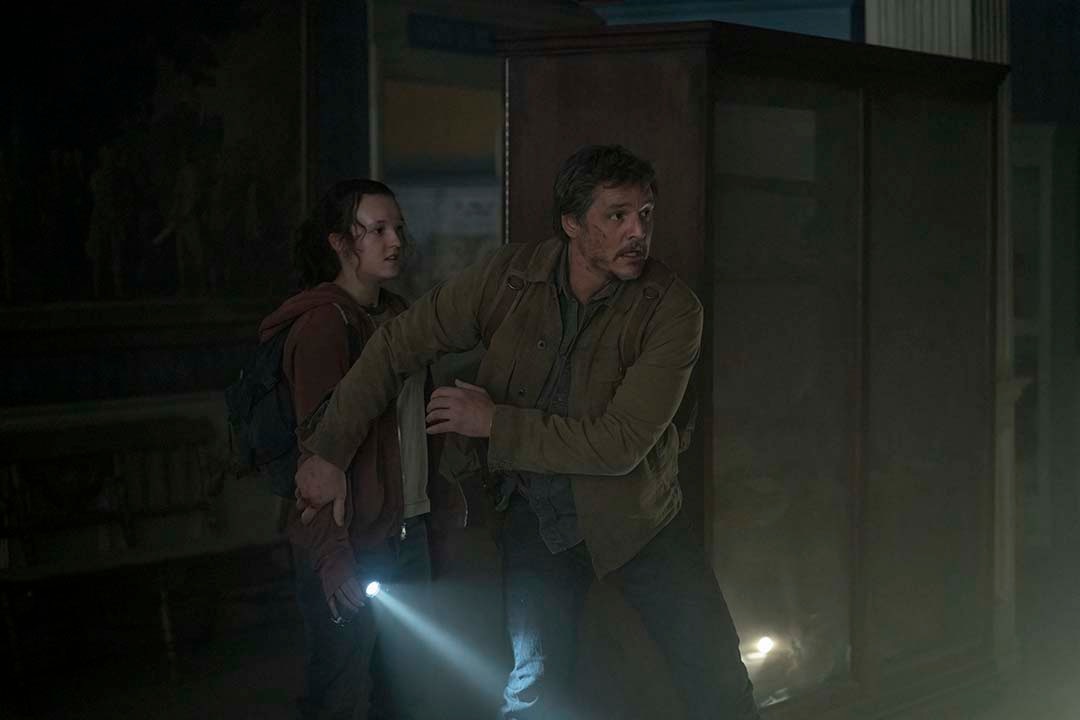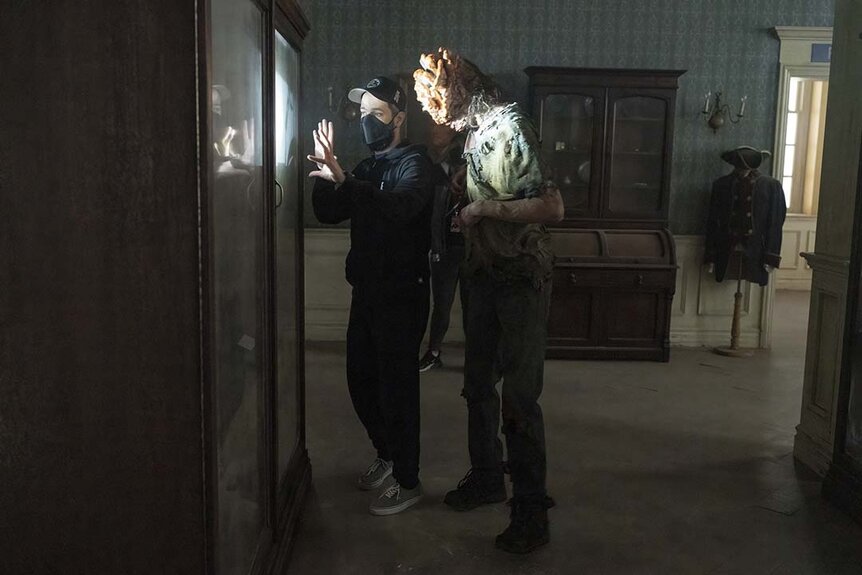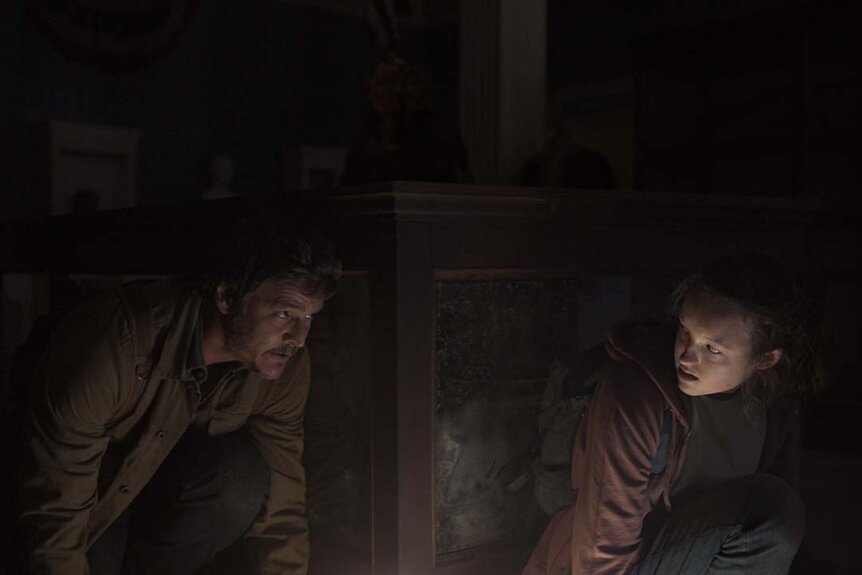Create a free profile to get unlimited access to exclusive videos, sweepstakes, and more!
The creators and stars of 'The Last of Us' set the stage for the anticipated HBO series
Series co-creators Craig Mazin and Neil Druckmann, and actors Pedro Pascal and Bella Ramsey set the stage for The Last of Us series.

When Naughty Dog's The Last of Us was released for the PlayStation 3 in 2013, games and critics alike reacted as though the heavens had gifted them a video game experience akin to the best of what cinema or high-end television had to offer. Set in a post-apocalyptic near future after a mutant Cordyceps fungus infects the majority of humanity, the game tells the story of two survivors — hardened middle-aged Joel and 14-year-old Ellie — trying to cross the ravaged United States. Ellie's seeming immunity to the infection might be the only hope that humanity has to create a vaccine, and so Joel promises to deliver her to the only experts left.
It was such a monster hit for Naughty Dog and writer Neil Druckmann, that everyone assumed a movie adaptation would be greenlit immediately. But it languished in developmental hell until Druckmann decided that maybe a television series would be the better medium. Impressed with Craig Mazin's recent limited series, Chernobyl, for HBO, Druckmann invited Mazin to lunch and asked how they could get HBO interested in a The Last of Us series. As a huge fan of the video game, Mazin signed up to co-pitch the project, and now, a decade after The Last of Us game first came out, it's an HBO series starring Pedro Pascal (The Mandalorian) as Joel and Bella Ramsey (Game of Thrones) as Ellie.
SYFY WIRE spoke with Mazin, Druckmann, Pascal, and Ramsey about their experience with the game before this series, how they navigated these adaptation changes, and how the actors bonded behind the scenes as co-leads of this emotional series.
Adapting from Console to Screen
How was it coming together to work on an adaptation when one of you created this world and the other played it?
Craig Mazin, Executive Producer/Co-showrunner: Well, it was easier for me, because I didn't have to spend seven years trying to make a movie. I played the game when it came out and I fell in love with it, like everyone. But I always like to point out that Neil was the most gracious and flexible author of source material perhaps ever. People that write things can be very precious and rigid. He's the opposite of that. He was never liked that.
Neil Druckmann, Game Creator/Executive Producer/Co-showrunner: The show has to stand on its own and that was the main goal. Say, if you don't know anything about the game, or Naughty Dog, this should just work as a quality HBO show that stands alongside the great HBO shows that are out there. Then, Craig is a fan and I'm a fan of the game that I worked on, so we can say, as fans, that we would want a quality story that honors the original source material. That would be more important to me than anything.
Did you, or HBO, impose any mandates about how much you needed to strictly adhere to the video game narrative in the series?
Mazin: All the decisions we made were always from the inside out, never from the top down. Nothing cynical, calculating, exploitative, or manipulative. We just insisted on telling the best story we could, inspired by the best story that we had. And HBO gave us total freedom. We could have even done more episodes. They let us own the story as we wanted to, relying on us to not be bloated and overstuffed. We wanted every episode to feel like it's all compelling and not simply there because we were allowed to do more.
There's been a steady stream of pandemic and virus-centric TV shows in the last three years. Was that ever a concern that there might be audience fatigue or even pressure to change the story to distinguish The Last of Us as a series for today?
Mazin: I think it's a trap to worry about what's been out or what's coming out. You can do all that calculation and then three weeks before your show comes out, some other show comes out doing everything you do, and you [wonder] if you shouldn't have made those choices. There are similar themes and similar storylines in everything. But we connect to those weird, intangible things that are hard to explain.
Druckmann: And it's funny, now we talk to people that have watched the show, and then went back to play the game, and they say the show has somehow enriched the game for them.
In shaping the first season of The Last of Us, was it immediately clear to you the best place in the game narrative to end Season 1?
Mazin: We were pretty clear about that without any debate. Not that Neil and I didn't occasionally wrestle over stuff, but by and large, our instincts aligned. And that one was an easy one for us.
Druckmann: We had the privilege of knowing where the story goes, knowing there are certain things we couldn't do in the game. We had the foreknowledge of The Left Behind story or The Last of Us Part II.
Stepping Into the Shoes of Joel and Ellie
Bella, the game is 10 years old now so did you have any prior experience with it before you auditioned?
Bella Ramsey, Ellie: Before I got the audition, I hadn't played it or seen any of it. But then I did watch some gameplay because I don't have a console in order to play the game. So I watched some of it and it was pretty cool. I could see immediately why everyone loves it so much. I still haven't played it. It's sitting at home waiting for me to play it. But even without playing it, just like being in the world of it, I'm sort of obsessed with it. So I understand the attachment that people have, because it's very special.
Pedro, there's certainly a through line between your Mandalorian character Din Djarin, Grogu's father figure, and Joel, who becomes a father figure to Ellie in The Last of Us. Did the roles inform one another?
Pedro Pascal, Joel: Not only that, but they were happening simultaneously as well. It's an amazing double dip for me. I think that there are really, really strong comparisons in terms of their journeys and their relationships. With Joel, I think it is a really fascinating opportunity to discover elements from the source material, from Craig's and Neil's pages, from our locations, our sets, our effects, and being with Bella all the time. That really put all of the pieces together for me, and I continued to discover them. Only in retrospect, when you're asking this question, do I realize that maybe as far as Mando and Joel are concerned, they were sort of in a relationship and informing one another.
Bella, how did it feel being the co-lead in a series of this scale, with such expectations from an existing fanbase?
Ramsey: I was extremely grateful to have Pedro leading it with me. Even from the get-go, like when I read the scripts, I was just relieved for it to be Joel and Ellie. It felt like a comfort blanket and just having this constant support of someone experiencing the same thing as you, and every day too. We just immediately connected in the same experience which was super special and I was really, really continually grateful for that right up until the very last day. It's been just so cool to have Pedro as a guide for all of this. And I really loved being a lead mainly because it meant I got to spend so much time on set, which is my favorite place ever. Every set that I go to is the only place that I feel like I properly belong and fit in. So to have that experience for an entire year and to be there a lot of the days was really cool. It was the happiest that I've been.
The Last of Us premieres on Jan. 15 on HBO. These interviews were edited for length and clarity.
Looking for more sci-fi TV? Check out shows like Resident Alien, Brave New World, Project Blue Book, Eureka, Heroes, Intergalactic, and more streaming now on Peacock. Looking ahead, SYFY has the new series — The Ark— from original Stargate film producer Dean Devlin, as well as Stargate SG-1 producer Jonathan Glassner.




























